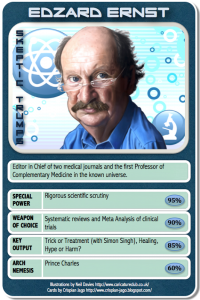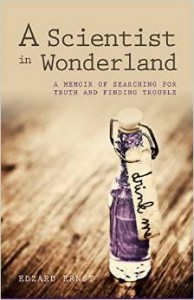Dietary and nutritional products and procedures that do not derive from standard or regular practices are frequently used in complementary and alternative medicine, but the safety and effectiveness of many of these products and procedures are unknown.
Statements made by prescribers promoting alternative nutritional therapies may sound promising; however, the scientific community usually does not know how effective or safe these treatments are. Before going further, we want to make it clear that the information about human nutrition and dietetics currently being taught in (Spanish) universities belongs to science-based conventional western medicine (as explained by the Ministry of Health, Social Policy and Equality in its report entitled Terapias Naturales [Natural Therapies]). Sometimes, when study results regarding such complementary and/or alternative therapies are not found to be favourable, prescribers and users of these therapies label contemporary science as being «unfair» or deem the research as unable of properly evaluating the effects of these therapies. Similarly, when scientific evidence is being assessed, people who advocate (and sometimes use) these complementary and/or alternative therapies usually suggest that biomedical databases do not contain studies of alternative therapies. These advocates then suggest that evidence for or against alternative medicine is incomplete because not all research on these matters is taken into account.
To answer some of the questions regarding alternative and complementary medicine,  Evidencia en Nutrición has conducted a mini-interview with Dr Edzard Ernst (@EdzardErnst). Dr Ernst is a professor of complementary medicine at the University of Exeter in the UK; he is also one of the most critical and sceptical minds in this matter. He has published more than 1000 medical journal articles, 48 books, and many in-depth blog posts, many of which criticise complementary and alternative medicine. Dr Ernst is a medical doctor who has received specific training in acupuncture, autogenic training, phytotherapy, homeopathy, therapeutic massage, and spinal manipulation. He was appointed as an Emeritus Professor at the University of Exeter in 1993, where he currently teaches complementary medicine. He is also the editor-in-chief of two medical journals: Perfusion and Focus on Alternative and Complementary Therapies.
Evidencia en Nutrición has conducted a mini-interview with Dr Edzard Ernst (@EdzardErnst). Dr Ernst is a professor of complementary medicine at the University of Exeter in the UK; he is also one of the most critical and sceptical minds in this matter. He has published more than 1000 medical journal articles, 48 books, and many in-depth blog posts, many of which criticise complementary and alternative medicine. Dr Ernst is a medical doctor who has received specific training in acupuncture, autogenic training, phytotherapy, homeopathy, therapeutic massage, and spinal manipulation. He was appointed as an Emeritus Professor at the University of Exeter in 1993, where he currently teaches complementary medicine. He is also the editor-in-chief of two medical journals: Perfusion and Focus on Alternative and Complementary Therapies.
It is obvious that Dr Ernst is a qualified person to speak on this matter. Let’s get to the issue:
Question 1 – What is the difference (if any) between complementary and alternative therapy?
Edzard Ernst – Complementary describes the use as an adjunct to conventional medicine and alternative as a replacement. But it is important to realise that one modality can be used as either alternative or complementary medicine. This is why many use the term ‘CAM’ (Complementary and Alternative Medicine).
Question 2 – Is it possible to evaluate complementary and alternative therapies using scientific approaches? Is it doing well nowadays?
Edzard Ernst – CAMs can and should be tested like any other treatments. This can pose problems, for instance when there is no obvious placebo. But RCTs (Randomized Controlled Trials) are always possible and often desirable for testing the many therapeutic claims made for CAMs.
Question 3 – If scientists were asked to evaluate all scientific evidence about complementary and alternative therapies, which electronic databases do you think they would need to consult to guarantee that (almost) all published articles had been evaluated?
Edzard Ernst – It would be wrong to assume that one database can suffice. Depending on the subject area, one needs not just the standard sources like Medline and Embase but also specialised databases. Also one needs to consider languages other than English, for instance for Traditional Chinese Medicine (TCM).
Despite the small number of questions we asked Dr Edzard Ernst, we think we can draw some conclusions from his answers that could be very interesting for readers of Evidencia en Nutrición. We also believe Dr Ersnt’s answers could be helpful for research methods of studying complementary and alternative nutritional therapies. The following text is our own interpretation of the interview:
1. There is a significant difference between complementary and alternative therapies. Dr Ernst explains that according to the National Centre for Complementary and Integrative Health (which is run by the UK government), complementary therapy is used to complement conventional therapy, while alternative therapy is an alternative to conventional medicine. This differentiation is much more significant than it may seem, above all taking into account the least encouraging and optimistic supposition. When an untested therapy (even a conventional or standard therapy) is used to complement a clinically-tested treatment, the assumed risks are usually unknown adverse effects or interactions between therapies. However, when an untested therapy is used instead of a clinically tested one, the assumed risks are exponentially higher. In this scenario, the patient is not being treated with the therapy which could have the potential to cure. The worst possible outcome of this avoidance would be the deterioration of a patient’s prognosis, while a decrease in the patient’s overall quality of life would be a less severe result of this avoidance. Dr Ernst advises that the same kind of therapy may sometimes be used as a complementary therapy and other times be used as an alternative therapy. This suggests that all complementary and alternative therapies (even those related to human nutrition and dietetics) should be properly clinically tested before they are commercialised.
2. Dr Ernst leaves no doubt regarding the ability of contemporary science (including both primary and secondary research) to assess the effectiveness of complementary and alternative therapies, stating that these therapies ‘can and should be tested like any other treatments’. Furthermore, RCTs and meta-analyses of RCTs are the best type of evidence of effectiveness of therapies. This reminds us of one of Dr Ernst’s famous sayings: ‘the plural of anecdote is anecdotes, not evidence‘. We recommend reading Testing Treatments: Better Research for Better Healthcare for those who want to know more about this topic.
3. In addition to standard databases like Medline and Embase, specialised databases should be used when gathering and assessing scientific evidence about complementary nutritional and alternative therapies. Databases similar to the Natural Medicines Comprehensive Database should be analysed to ensure that all relevant publications are considered when researching complementary and alternative medicine. Dr Ernst also advises researchers to avoid language bias, meaning that we should be open to finding research in languages other than English. This research may sometimes be unattainable, such as Chinese research. In this regard, international initiatives (like Cochrane, an institution with authors from different countries) should be promoted to help overcome language barriers. This would make it possible for researchers to have access to a greater variety of scientific publications, thereby allowing a more comprehensive assessment of the available evidence.
We sincerely hope that this interview with a great medical professional has answered  some of the questions regarding the research and assessment of evidence for complementary and alternative therapies. Of course, we encourage you to read Dr Ernst’s blog as well; more specifically, we recommend a blog entry regarding research difficulties in alternatives therapies: ‘Alternative Medicine, the Baby, and the Bath Water‘. This post shows how an exceptional mind interprets and overcomes these difficulties instead of move away from the hardest scientific tests. Likewise, we encourage you to read some of Dr Ernst’s books, especially the most recent one: A Scientist in Wonderland: A Memoir of Searching for Truth and Finding Trouble (2015).
some of the questions regarding the research and assessment of evidence for complementary and alternative therapies. Of course, we encourage you to read Dr Ernst’s blog as well; more specifically, we recommend a blog entry regarding research difficulties in alternatives therapies: ‘Alternative Medicine, the Baby, and the Bath Water‘. This post shows how an exceptional mind interprets and overcomes these difficulties instead of move away from the hardest scientific tests. Likewise, we encourage you to read some of Dr Ernst’s books, especially the most recent one: A Scientist in Wonderland: A Memoir of Searching for Truth and Finding Trouble (2015).
We want to express our heartfelt gratitude to Dr Edzard Ernst for spending his valuable time in our project.
Working team: Eduard Baladia (@EBaladia), Rodrigo Martínez-Rodríguez, Julio Basulto (@JulioBasulto_DN)